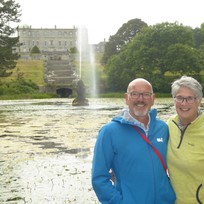( Overview
/ Two Bullocks on a Boat in Eire
Another recommendation from Regina, Nano Nagle Place. We decided to go on the guided tour, and what a good idea that was!
Agnes was an inspirational guide. I was moved by her faith and love and respect for Nano Nagle. Matched by her enthusiasm in imparting that love and knowledge.
The Chapel at Nano Nagle Place. Honoria Nagle was born to a wealthy family in 1718. Education for Catholics wasn’t available in Ireland because of the Penal Laws of 1695, but despite also being forbidden to travel abroad to be educated, she and her sister were sent to Ypres, and then lived in Paris.
Living with relatives in Paris, she and her sister had a privileged lifestyle, but she became increasingly aware of those living in poverty, and when she returned to Ireland after her father died, she was appalled by the life of the poor in Ireland, often a result of no education.
She and her sister offered help to families, and when Ann died suddenly, Nano decided she would devote her life to the needy. Initially she entered a convent, but realising this was enclosed, she returned to Cork, living with her brother and his wife, so that she could offer children an education.
Since operating a Catholic school was illegal, she worked in secret, even initially from her brother, starting in a small mud cabin, but eventually having 7 similar ‘schools’ across Cork for girls and boys. For 17 years she worked with little help, assisting the poor and educating children.
Financially she was supported by her uncle, but she also needed to beg until she inherited from him when she was 57. She and three others became nuns and founded the Presentation Order dedicated to education and social inclusion, and a convent was built on the site of a small cottage on Cove Street.
She and her followers promised poverty, chastity and obedience to God, but they did not take enclosure and cared for those near where they lived. As the Penal Laws relaxed in the 1770s, the convent built in 1775 could be used to offer education for Catholics more openly.
Her brother, who had moved to Bath, sent this clock on the opening of the convent, which is in her parlour in the convent. She taught religious studies from here, but spent much of her day walking the streets of Cork, tending to people’s needs.
In 1783 Nano undertook to build almshouses for elderly women and begged funding from wealthy merchants. She also had long days constantly walking through over-crowded alleys and in every dwelling, with no consideration for her health. This took its toll, and she died at the age of 66 in 1784.
Although she requested to be buried in a public cemetery amongst those she served, her fellow nuns and the Ursulines decided she be buried in the Ursuline cemetery. Her tomb has since been moved, and is now a place of pilgrimage. She was Declared Venerable by Pope Francis in October 2013.
She herself said, however, “I often think my schools will never bring me to heaven, as I only take delight and pleasure in them.”
Unfortunately Rome decreed all convents should be enclosed from 1805 to 1966, but the Presentation Sisters continue her work in communities throughout the world.
The Presentation Sisters continue the legacy of providing for the local area; Nano Nagle Place is now a community centre and cafe. As well as the only museum dedicated to a woman in Ireland, it also houses educational charities and rooms are available to let by community groups and local businesses.






















 Sign in with Apple
Sign in with Apple  Log in with Facebook
Log in with Facebook